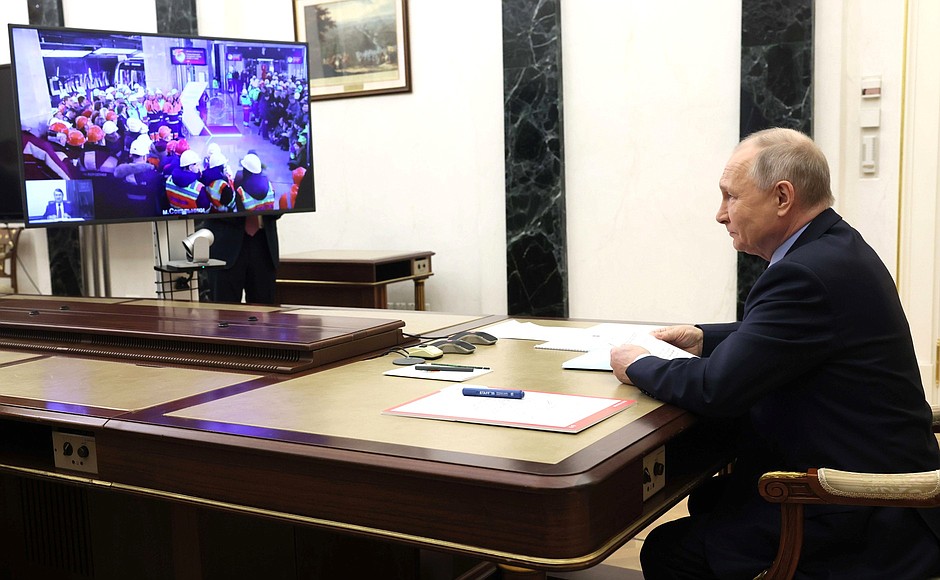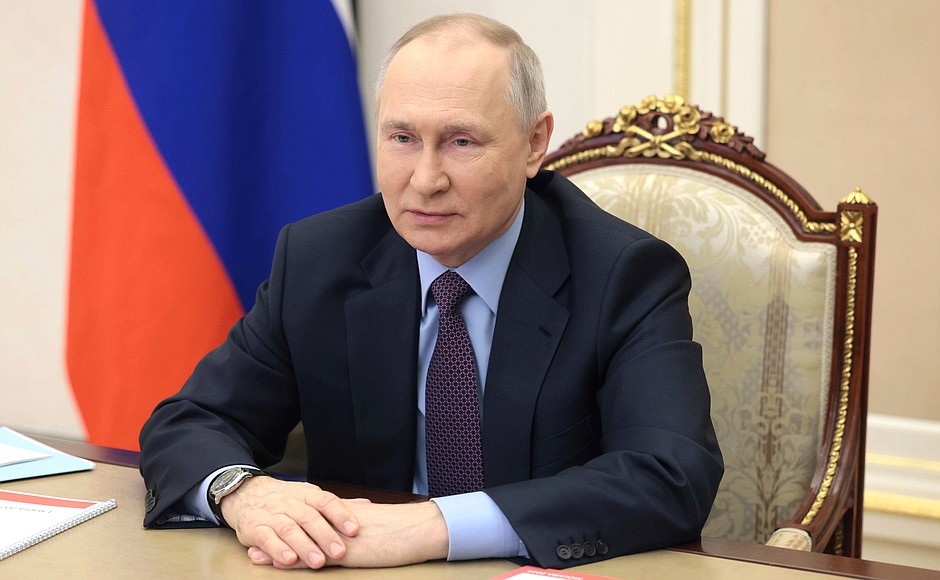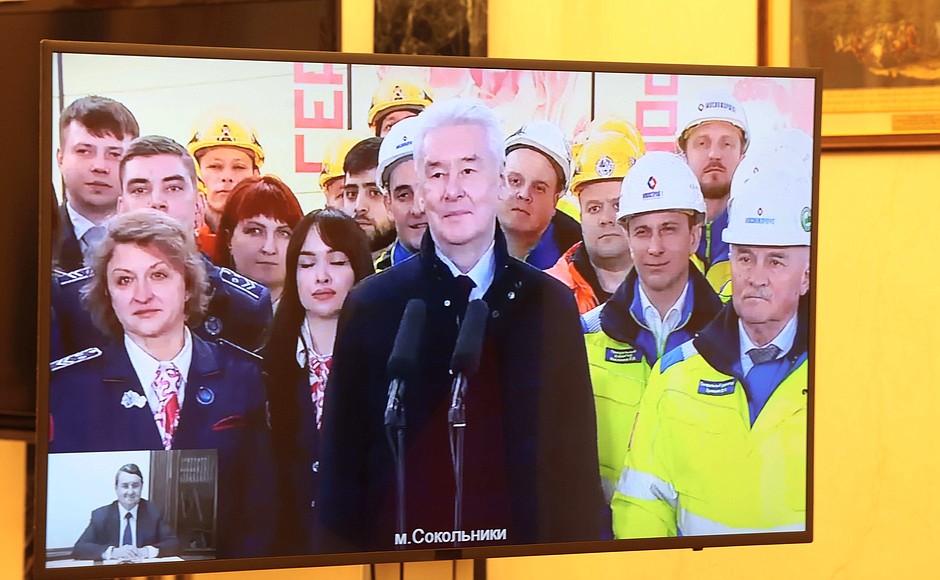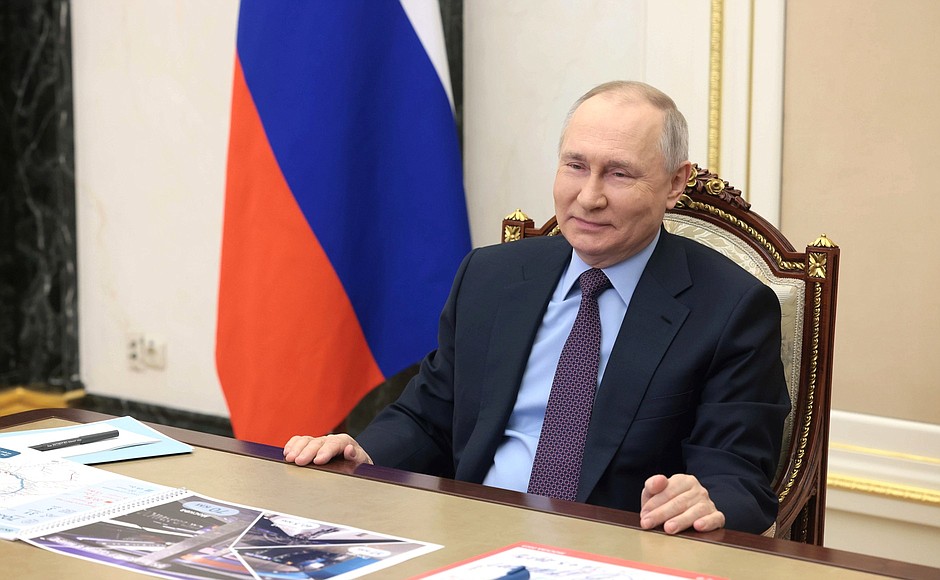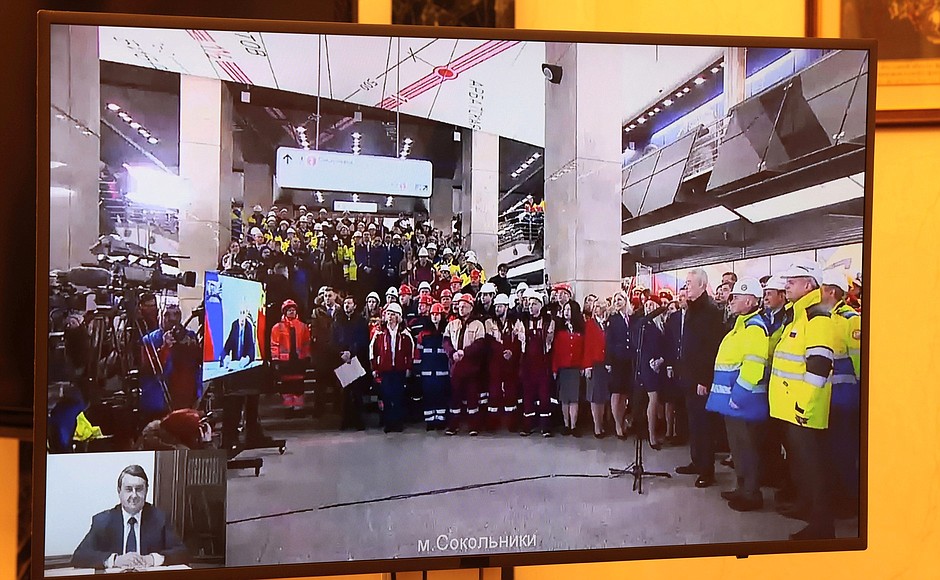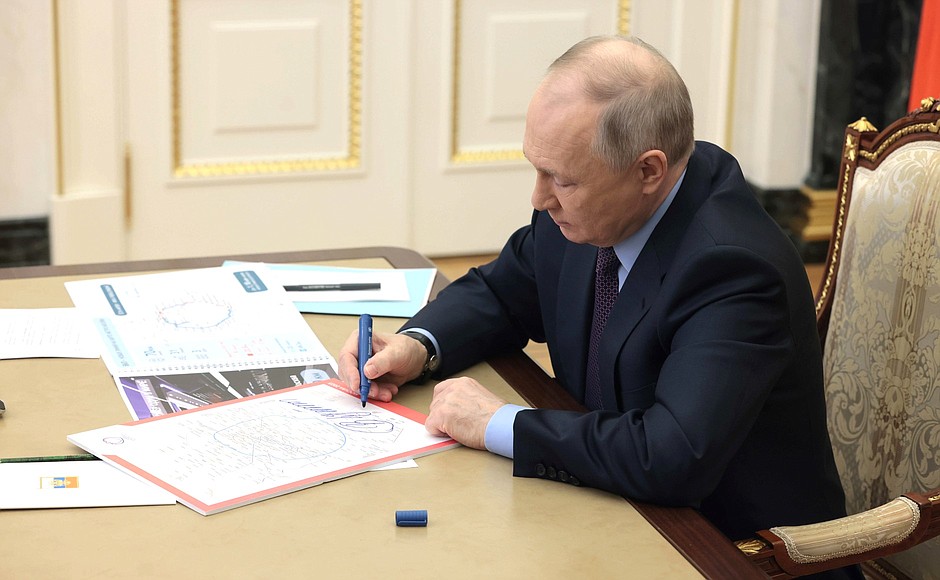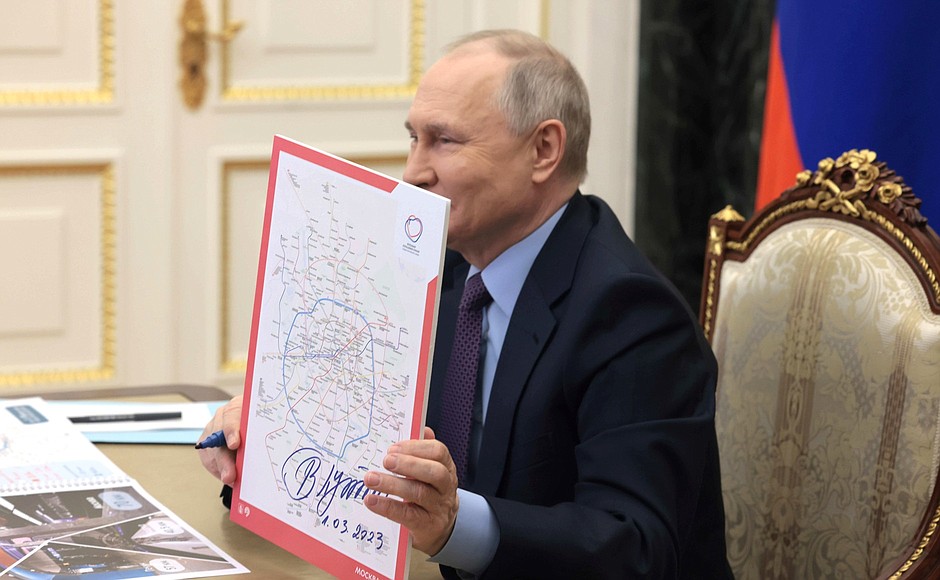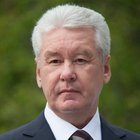The following nine stations of the Big Circle Line (BCL), the last to open, were put into operation: Maryina Roshcha, Rizhskaya, Sokolniki, Tekstilshchiki, Pechatniki, Nagatinsky Zaton, Klenovy Bulvar, Kashirskaya and Varshavskaya.
The BCL has become the largest metro construction project in Russia and one of the biggest completed worldwide in recent decades: 70 kilometres of railway lines, 31 stations and three electric depots.
The launch of the new line will improve transport services in 34 Moscow city districts with a population of 3.3 million people and will also significantly reduce the load on other lines. On many routes, daily travel times are expected to be up to 45 minutes shorter.
* * *
President of Russia Vladimir Putin: Friends, good afternoon.
I see the main builder among his colleagues and support staff. Mr Sobyanin, my greetings to you.
Friends,
Today, we are launching nine stations on the Moscow Metro’s Big Circle Line. This is the final stage in this large-scale construction project. Mr Sobyanin updated me regularly on its progress.
Now that the entire circle line is fully operational, passengers can use all its stations. I would like to congratulate people from Moscow and the Moscow Region on this marvellous occasion.
Let me note that plans to build a circle metro line connecting radial lines outside the city centre took shape a long time ago, back in the Soviet era. However, they remained on paper, for various reasons, for quite some time. Today, this major undertaking, which the city needs so badly, and it is today that it needs it, has been completed thanks to the tireless efforts of the city government with Sergei Sobyanin at its head.
Of course, I would like to thank those who joined the city mayor at the ceremony: workers, engineers, and various professionals, as well as all those who were involved in building the line, this great construction project. Thank you for your readiness to deliver on the most challenging technological objectives. You have completed a very important project in a short time. As I have already said, it would not be an exaggeration to call it a titanic endeavour in expanding the metro network and infrastructure development in general.
The 70-kilometre-long Big Circle Line is the longest underground circular line in the world, longer even than the current leader, the circle line of our Chinese friends’ Beijing Subway. I plan to meet with the President of China, and if the agenda permits, we will be happy to show it to our guests. At least, I think that members of the delegation should be able to see it.
The main thing is that the BCL will vastly improve the capital’s transport system. It will reduce traffic on many motorways, stimulate the development and improvement of adjacent districts, and make the life of our megacity and its residents and visitors more comfortable and dynamic. I believe that the passengers who use the parts of the line that are already in operation appreciate its benefits, including shorter travel time.
Overall, I would like to express appreciation for the hard work done by the Moscow authorities over the past few years to develop the urban transport infrastructure. You may remember – Muscovites definitely do – that some time ago we thought about and looked with dismay at the transport situation in large cities, such as Moscow, racking our brains about solutions to all of the city’s problems. In the meantime, the city authorities were working hard and persistently, and they ultimately achieved a good result, even though there are still quite a few outstanding issues.
In particular, the network of the Moscow Metro, including the metro and the Moscow Central Circle, has increased by 50 percent over the past 10 years. The rolling stock has been updated substantially, 70 percent of it, and modern engine houses have been built.
It is also notable that such transport projects are having a positive effect on the development of the national mechanical engineering industry. Moscow is placing large orders, which helps create tens of thousands of skilled jobs in many Russian regions.
I know that Moscow has many forward-looking plans in the sphere of transport, and I have no doubt that all of them will be implemented.
I am confident that you will always follow the best labour traditions. To demonstrate our respect for many generations of metro builders, I have signed, as you know, an executive order on the establishment of Metro Builders’ Day. It will be marked on October 2. Why that day? Because the decision to build the Moscow metro was approved on October 2, 1931. In a way, it was the day the metro was born in Russia.
I would like to again congratulate you on today’s achievement, to wish the builders and all other Moscow metro personnel fruitful work and to express the hope that the city will attain new major successes.
Thank you very much for your efforts.
Mr Sobyanin, please.
Mayor of Moscow Sergei Sobyanin: Mr President,
Thank you for your appreciation of Moscow’s construction industry and the city’s efforts to upgrade the transport system.
You are absolutely right to say that this occasion is a truly historic event not only for the metro, but also for the entire transport system and for the city of Moscow. This is the largest and most challenging project in the history of metro construction. This is the new heart of Moscow's transport system, which brings the MCD, the MCC, and the regular metro lines together into a seamless transport system. And it can be extended by adding new metro lines, shaping the future of the transport system.
This is definitely a large and important project, which could never be implemented by one industry or one agency. Every industry and every system in Moscow have contributed to this project. Even more than that – the city’s entire economy and full potential was used for this project. And today, I am conveying words of gratitude to every Muscovite, because in one way or another, they have contributed to this project.
Of course, many thanks to the metro builders. What they accomplished was a feat, without exaggeration. Their effort was heroic, because they worked in the most challenging conditions.
I am grateful to every company that supplied materials, equipment and, as you rightly said, the most up-to-date trains built over the period of construction – metro trains that are in no way inferior to the best in the world.
Mr President, thank you very much for your close attention to Moscow’s development and your all-out support. Without your involvement and support, it would be difficult to even imagine that we could implement such a huge world-class project.
Not so long ago, we launched the second stage of the BCL; today we are opening the third and final stage. If you do not mind, I would like to ask you to sign this new metro map, with the complete new circle line, the Moscow Metro’s Big Circle Line. It will be a good memory of today's event.
Vladimir Putin: With pleasure.
Sergei Sobyanin: Thank you very much. Great.
Mr President, as is traditional, I am asking for your order to launch the Big Circle Line.
Vladimir Putin: What do you think the answer will be?
Go ahead. Godspeed!
Sergei Sobyanin: Let's go, guys!
Thank you very much, Mr President.
Vladimir Putin: Thank you.
I would like to emphasise again what I said in my opening remarks. Moscow and the Moscow government are working very hard on the development of infrastructure and are achieving success – most importantly, going at it purposefully, methodically, and at a very professional level, I want to emphasise this, a very professional level. When it comes to something you use every day, you hardly ever think about the problems that had to be solved – and there were a million of them, maybe not even a million, a huge number, and the approach should be highly professional in every segment of this job. And you did it.
Again, I congratulate all of you – the Moscow Mayor, the team, and everyone else who was engaged in this work, without exaggeration, from workers to engineers and designers, and mechanical engineers.
All the best!
Sergei Sobyanin: Thank you.
Vladimir Putin: Good luck.
